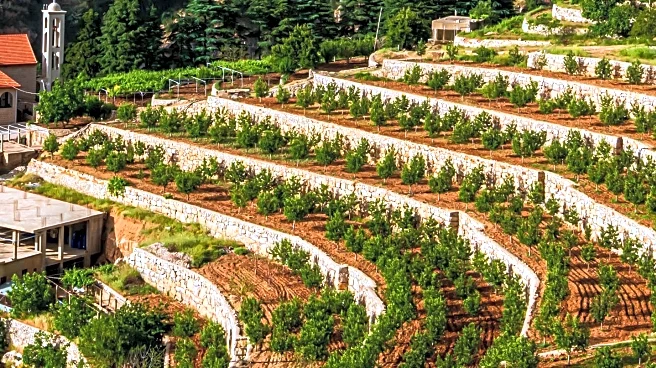What's Happening?
In the Upper Galilee, agri-tourism is emerging as a significant economic driver, showcasing the region's resilience and agricultural diversity. Despite recent challenges, including conflicts that have impacted harvests, local farms are leveraging their unique environmental conditions to produce high-quality crops and artisanal products. Rom Farm, for instance, combines luxury glamping with agricultural tours and cheese tastings, offering visitors a direct connection to nature and farming practices. Schwartz Farm, known for its diverse cheese varieties, and Pecan Ha'Tzafon, which produces pecan-based products, are also part of this burgeoning sector. These farms not only provide unique visitor experiences but also contribute to the local economy by promoting sustainable agricultural practices and rural entrepreneurship.
Why It's Important?
The development of agri-tourism in the Upper Galilee is crucial for the region's economic recovery and growth. By attracting tourists, these initiatives help sustain local businesses and create jobs, particularly in rural areas where traditional agriculture faces numerous challenges. The focus on sustainable practices and high-quality products also positions the region as a leader in eco-friendly tourism, appealing to a growing market of environmentally conscious travelers. This trend supports the preservation of local culture and traditions while fostering innovation in agricultural techniques. As a result, the Upper Galilee's agri-tourism sector not only enhances the region's economic resilience but also contributes to broader efforts in sustainable development and rural revitalization.
What's Next?
Looking ahead, the continued expansion of agri-tourism in the Upper Galilee is likely to attract more visitors and investment, further boosting the local economy. Farms may explore new partnerships and product offerings to enhance their appeal and competitiveness. Additionally, there may be increased collaboration with government and tourism agencies to promote the region as a premier agri-tourism destination. Stakeholders will need to address challenges such as infrastructure development and workforce training to support this growth. As the sector evolves, it could serve as a model for other regions seeking to leverage their agricultural heritage for economic and social benefits.
Beyond the Headlines
The rise of agri-tourism in the Upper Galilee also highlights broader cultural and environmental implications. By fostering a deeper connection between consumers and the land, these initiatives encourage sustainable consumption patterns and greater appreciation for local food systems. They also provide educational opportunities for visitors to learn about ecological farming methods and the importance of biodiversity. In the long term, the success of agri-tourism could influence policy decisions related to rural development and environmental conservation, promoting a more integrated approach to regional planning and resource management.











